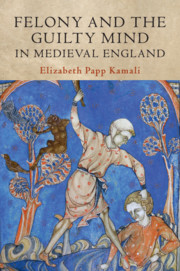Book contents
- Felony and the Guilty Mind in Medieval England
- Studies in Legal History
- Felony and the Guilty Mind in Medieval England
- Copyright page
- Dedication
- Contents
- Figures
- Acknowledgments
- A Note on the Text
- Abbreviations
- Introduction
- Part I Felonia Felonice Facta: Felony and Intentionality
- Part II Þe Deuylys Doghtyr of Hellë Fyre: Felony and Emotion
- Part III Handlyng Synne: Guilt and Innocence
- Part IV Dies Iræ: Judge and Jury
- 7 Tales of Judging
- 8 The Mind and Comportment of Judge and Jury
- Conclusion
- Bibliography
- Index
8 - The Mind and Comportment of Judge and Jury
from Part IV - Dies Iræ: Judge and Jury
Published online by Cambridge University Press: 18 July 2019
- Felony and the Guilty Mind in Medieval England
- Studies in Legal History
- Felony and the Guilty Mind in Medieval England
- Copyright page
- Dedication
- Contents
- Figures
- Acknowledgments
- A Note on the Text
- Abbreviations
- Introduction
- Part I Felonia Felonice Facta: Felony and Intentionality
- Part II Þe Deuylys Doghtyr of Hellë Fyre: Felony and Emotion
- Part III Handlyng Synne: Guilt and Innocence
- Part IV Dies Iræ: Judge and Jury
- 7 Tales of Judging
- 8 The Mind and Comportment of Judge and Jury
- Conclusion
- Bibliography
- Index
Summary
Chapter 8 opens with the story of Erkenwald and the righteous pagan judge, inviting the reader to consider not only the complexities of defendants’ mental state, but also the mental state of persons engaged in the act of judging; this, too, would be subject to scrutiny at the Last Judgment. The chapter argues that medieval English felony law was based upon the equitable balancing of harsh justice and mercy; for a justice or jurors to stray too far in either direction could be condemnable. Drawing upon cautionary tales about judging, the chapter highlights themes that appear in medieval English literary and religious sources, including the notion that justices should not waver too greatly in decision-making, being swayed by money or ill advice; that justices should also not be too inflexible, but should rather reconsider a judgment that in hindsight appeared to be mistaken; and that justices and jurors should beware lest their decisions be informed by anger rather than measured consideration of the facts. The chapter illuminates the ways in which mind mattered not just for determining the culpability of criminal defendants, but also for assessing the culpability of individuals tasked with sending felons to the gallows.
- Type
- Chapter
- Information
- Felony and the Guilty Mind in Medieval England , pp. 270 - 302Publisher: Cambridge University PressPrint publication year: 2019

